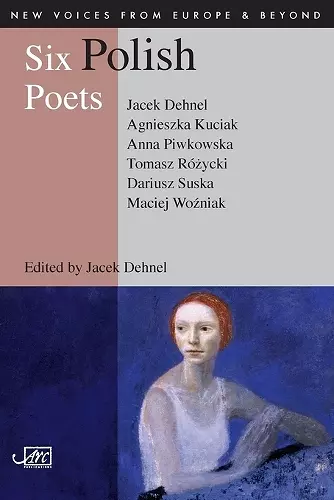Six Polish Poets
Format:Paperback
Publisher:Arc Publications
Published:1st Sep '08
Currently unavailable, and unfortunately no date known when it will be back

Six Polish Poets makes available to the English-language reader the poetry of the younger generation of poets who whose first collections (with one exception) have been published in the past decade. Unlike the poets of the previous generation who, in the period of new-found freedom after the fall of communism, adopted a highly individualistic, anarchic, sometimes brutal style, the poets represented here re-examine and experiment with traditional poetic forms, themes and cultural references in poems that are refined and witty, moving and informed, ranging across every aspect of human existence. This anthology is both thought-provoking and full of warmth and humanity, and while it cannot claim to be representative of contemporary Polish poetry as a whole, it nevertheless provides an insight into today's literary scene in Poland. Parallel text: Polish / English
'Six Polish Poets' is the second bilingual anthology of Polish poetry, published by Arc. It is also the fifth volume in the series 'New Voices from Europe and Beyond' which brings contemporary world poetry to the English-language readers. The book features a selection of poets who made their debuts in the past two decades; mostly, however, in the 1990s or later. As Jacek Dehnel, the volume's editor and one of its contributors, rightly points out, the authors' common feature is re-examination and deconstruction of traditional poetic forms and themes. In the poems presented here, the metric and rhythmic structures undergo bold alterations, while the imagery and poetic voice become largely influenced by contemporary language. The anthology opens with a selection of poems by Anna Piwkowska, whose verse reveals a mature approach to questions of love and gender. What strikes the reader here, however, is the skilful use of traditional syllabic patterns, such as the thirteen-syllable line, which has been part of the Polish poetic tradition for centuries. With slight modifications, it appears in the poem 'A Train'. Together with the well-structured rhyming scheme, it turns the literary description of a train journey into a melodic and sensual flow of sounds. Even though one would expect those devices to be lost in translation, the exceptional rhythm and beauty of this poetry have not disappeared in the adept translations by Elzbieta Wojcik-Leese. In comparison to Piwkowska's verse, Dariusz Suska's texts can be situated at the far end of the thematic and linguistic spectrum. The exploration of death intertwines in his oeuvre with childhood memories, while the persona often wears at once the masks of an adult and a child. The presented poems reveal, above all, Suska's extraordinary quality in capturing the very essence of the Polish reality, its objects, conventional gestures and odd habits. It is enough to mention the images of the popular in the 1980s Wigry folding bicycles in the poem 'Go Down to the Cellar - ' or the Christmas Eve carp swimming in a bathtub, as presented in 'By the Twentieth...'. Mira Rosenthal's masterly translations of Tomasz Rozycki's verse comprise the third part of the anthology. Both, the poet's affinity with the form of the sonnet and his attachment to problems of history, identity, belonging and love are recognizable in the presented selection. Although unique and personal, his poems have a universal appeal which makes them equally valid both for Polish and English-language readers. Maciej Wozniak's poetry is almost entirely immersed in the world of music. It is not only the inspiration but also the rationale for Wozniak's oeuvre. Even love poems, such as 'Three Pieces for Two Voices and Lute', turn into musical explorations. In this particular text, John Dowland's songs serve as a stimulus to examine problems of love and its gradual fading. It is the skilful construction of the persona that strikes the reader in the selection of Agnieszka Kuciak's poems. Far from being fixed, the speaker seems to personify the contemporary human identity. Its main characteristics are movement, change and fluidity. These are also the elements that make Kuciak's poetry versatile, imaginative and inspiring. The anthology closes with works by Jacek Dehnel, the youngest poet in the volume and one of the most accomplished writers of his generation. The translations from Polish, by Antonia Lloyd-Jones and George Szirtes, fully convey Dehnel's passion for language and indicate the poetic influences that have shaped his work. Dehnel's texts are well grounded both in Polish and European literary tradition. Poems worth mentioning include 'Happiness' and 'Symmetry', both reminiscent of works by Philip Larkin - a poet that Dehnel has studied closely and translated into Polish. Overall, Six Polish Poets is an enjoyable and thought-provoking read which will surely appeal to a wide audience. The volume will be welcomed not only by students of Polish literature, but also by lovers of poetry seeking a first-rate reading experience. And last but not least, the book will be a valuable addition to the body of world literature in English. Ewa Stanczyk in 'The Review' (Manchester) 20 January 2009
ISBN: 9781904614500
Dimensions: unknown
Weight: unknown
160 pages